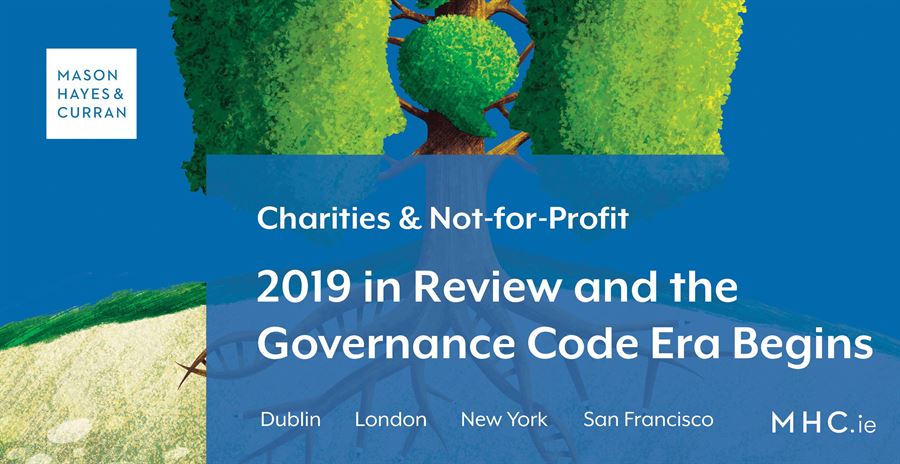Charities Update – 2019 in Review and the Governance Code Era Begins

The trend towards increasing charity regulation continued in 2019. It is more important than ever for charity trustees to stay up to date with new obligations. Most importantly, the Charities Regulatory Authority Governance Code has been in force since the beginning of 2020. If your charity has not finished its preparations for implementing the Governance Code it is important to do so as soon as possible.
The Charities Regulatory Authority Governance Code
The introduction of the Code is a significant development for the sector, and the amount of work involved in bringing your charity into compliance should not be underestimated. The Code will impact how charities operate, how they govern themselves, and how they demonstrate compliance to the Charities Regulatory Authority (CRA).
Charities must have put the necessary policies and procedures in place, and have finalised their Compliance Record Form, during 2020. In 2021 charities will need to certify to the CRA that they complied with the Code in the 2020 period. We worked with a number of our charity clients during 2019 to help them to prepare for implementation in 2020. If your charity has not started to implement the Code, we strongly recommend that you arrange for this to be done as soon as possible.
We previously provided some tips for compliance and background on the Code.
Beneficial Ownership Registers
In 2019 two sets of new “beneficial ownership” regulations came into effect, in relation to companies and trusts. These have caused a great deal of confusion in the sector, as charities do not have “beneficial owners” in a conventional sense.
The regulations are aimed at preventing money laundering, and they seek to identify the persons who control a company/trust in case authorities wish to contact the company/trust during the course of money laundering investigations. The regulations term this person/persons in control as “beneficial owners” – so often the relevant individuals will have no ownership interest at all.
Companies
All companies (including charitable companies) are now required to identify who their “beneficial owners” are under the regulations, to maintain an internal register, and to submit that information to the Central Register of Beneficial Ownership.
During 2019 we held seminars with the new Registrar of Beneficial Ownership and explored what the regulations mean for charities. We also met with organisations which represent the charity sector to flesh out how charities can file in a way that reflects their nature as charitable entities. You can read more about this here. The deadline for companies to file in the Central Register of Beneficial Ownership has passed - if your company has not yet filed you must do so immediately.
Trusts
Trusts are required to maintain an internal beneficial ownership register. In 2020 a publicly accessible central trust register may also be established. We have set out more information regarding this here.
The scope of both regulations is wide and non-compliance exposes trustees and directors to potential criminal sanctions.
Changing Times – How to Wind Up, Merge and Restructure Charities
During 2019, the CRA published guidelines to facilitate the better administration and management of charities coming together, winding up or restructuring. These guidelines were timely as restructuring and merging is becoming more common in the sector. We looked at this further in our February update.
If your charity is not a company there may be benefit in considering restructuring to a company. A company structure is a more modern and sometimes more appropriate structure for a charity of medium to large size, and it brings a number of important benefits. Restructuring to a company is not a straightforward process, and it is necessary to consider the legal implications of the restructure, but for a growing charity it is better to restructure sooner rather than later.
Merging is becoming more common within the charity sector as merging with another charity can benefit the charities and their beneficiaries, as charities working in the same area can benefit from economies of scale and consolidated compliance obligations. It is notable that it is now a requirement under the new Code to consider the benefits of merging.
Conclusion
If your charity is not already compliant with the Code you must ensure that it is compliant as soon as possible. Similarly, you must ensure that if your charity is established as a company or a trust that it is compliant with the new beneficial ownership regulations. If it is not you must ensure compliance immediately.
Additionally, there is benefit in your charity considering the advantages of restructuring and/or merging, and this is an increasing trend for the sector.
If your charity needs assistance with the new Code or beneficial ownership regulations, or wishes to discuss any of the matters set out in this roundup, please feel free to contact a member of our Charities & Not-for-Profit team. Our lawyers work solely in the area of charities and not-for-profit organisations, and are leading experts in the field.
The content of this article is provided for information purposes only and does not constitute legal or other advice.
Share this:


